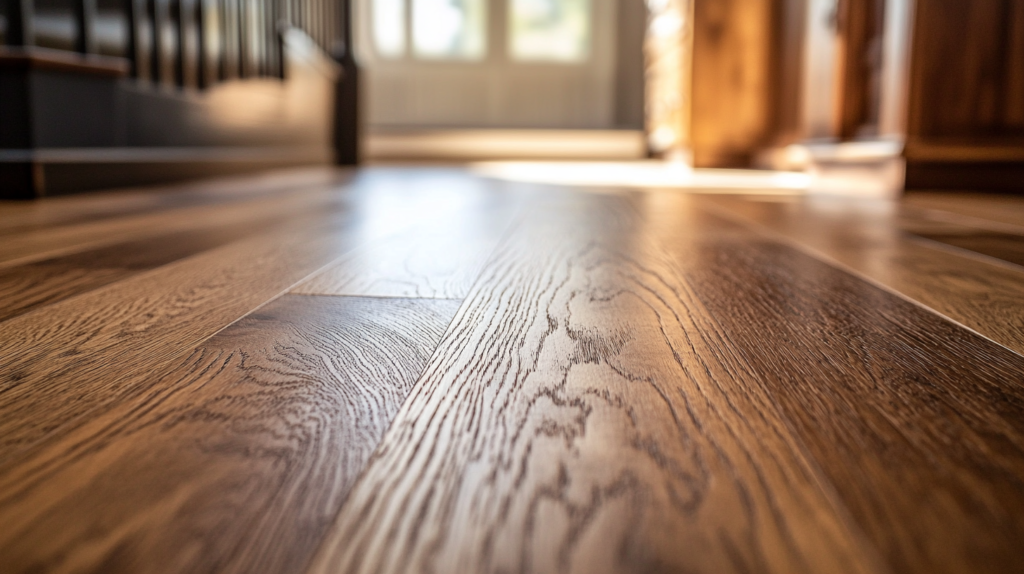
Choosing the right flooring can be a daunting task. With so many options available, it’s easy to feel overwhelmed.
One common dilemma is choosing between engineered hardwood and solid hardwood. Both offer their unique advantages and challenges.
In this article, we’ll delve into the key differences between these two types of flooring. We’ll compare their durability, installation process, cost, maintenance, and aesthetic variety.
Whether you’re a homeowner, an interior designer, or a real estate investor, this guide will help you make an informed decision. Let’s dive in.
Understanding Engineered Hardwood
Engineered hardwood is a popular choice for many homeowners. It’s made up of a top layer of real wood veneer attached to multiple layers of plywood or fiberboard.
This layered construction gives engineered hardwood its unique properties. It’s more resistant to changes in humidity and temperature compared to solid hardwood.
Engineered hardwood also offers a wide variety of design options. It can mimic the look of various wood species, providing flexibility in home decor.
Moreover, its installation is typically easier and quicker, often designed for click-together installation.
The Basics of Solid Hardwood
Solid hardwood is a classic flooring option. It’s a single, solid piece of wood throughout its thickness, offering a timeless appeal.
One of the main advantages of solid hardwood is its longevity. With proper maintenance, these floors can last for generations.
However, solid hardwood is more susceptible to changes in humidity and temperature. It can warp or cup in high-moisture environments.
Despite this, solid hardwood is often seen as the premium option for luxury installations, increasing the resale value of a home.
Durability and Maintenance
When it comes to durability, both engineered and solid hardwood have their strengths. Engineered hardwood’s layered construction provides dimensional stability, making it suitable for high-traffic areas.
On the other hand, solid hardwood can be sanded and refinished multiple times, extending its lifespan. However, it’s more prone to warping in high-moisture environments.
Maintenance for both types involves:
- Regular sweeping to remove dust and debris
- Occasional mopping with a wood cleaner
- Immediate cleaning of spills to prevent water damage
Installation Showdown
Engineered hardwood is typically easier and quicker to install. It’s often designed for click-together installation, making it a practical choice for DIY enthusiasts.
In contrast, solid hardwood often requires professional installation. This is due to the need for nails or staples, which can make the process more complex and time-consuming.
Key differences in installation include:
- Engineered hardwood can be installed over concrete and radiant heating systems
- Solid hardwood is not recommended for below-grade installations, such as basements
- The installation of solid hardwood can be more disruptive and take longer than engineered hardwood
Cost Considerations
The cost of engineered hardwood can be lower than solid hardwood. However, this varies based on the quality and thickness of the veneer.
Solid hardwood is often seen as the premium option for luxury installations, which can reflect in its higher price point.
Aesthetic and Style Options
Engineered hardwood offers a wide variety of design options. It can mimic the look of various wood species, providing flexibility in style.
Solid hardwood, on the other hand, is known for its timeless appeal. It can increase the resale value of a home due to its classic look.
Both types of hardwood can come in various finishes, including:
- Matte
- Semi-gloss
- High-gloss
Spotlight on Hand Scraped Engineered Hardwood Flooring
Hand scraped engineered hardwood flooring offers a distinct, textured look. This can add character to a room.
Moreover, this type of flooring can hide scratches and dents better than smooth finishes. It’s a practical choice for high-traffic areas.
Environmental Impact and Sustainability
Engineered hardwood can be more environmentally friendly. This is due to less wood being used in its construction.
However, some engineered hardwood products come with warranties that rival those of solid hardwood. This can extend their lifespan, reducing environmental impact.
Should I Get Real Hardwood Floors?
The choice between engineered and solid hardwood depends on your specific needs. Consider factors like budget, installation considerations, and personal preference for authenticity.
Both options can provide a warm and inviting atmosphere to any space. It’s about finding the right fit for your home.